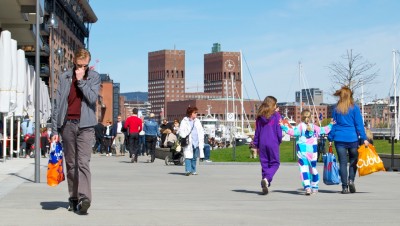Even Norwegians on the conservative side of the political spectrum appear willing to pay more taxes, in order to maintain the current level of social services offered by Norway’s social welfare state. A new survey indicates that the affluent are the most willing to pay more.

Norway is known for having some of the highest taxes and user fees in the world, with its 25 percent VAT on goods and services (which functions like a sales tax) and punitive taxes on alcohol, tobacco, cosmetics, cars, gasoline and other items viewed as either luxurious, polluting or unnecessary. The prospect of raising them even higher doesn’t seem out of the question.
A study conducted by research firm Synnovate for the Norwegian taxpayer association Skattebetalerforeningen shows that one out of three voters for Norway’s non-socialist (borgerlig) parties are positive towards higher taxes and fees.
Norwegian Broadcasting (NRK) reported on Friday that households with combined income of more than NOK 800,000 a year (about USD 126,000) were the most willing to go along with higher taxes, to maintain current welfare services like health care and education. Women over age 60 were the least willing.
Ongoing tax debate
Norway has largely escaped the ill effects of the global finance crisis now playing out in other countries, mostly because of its oil revenues and the state’s reluctance to use them. The vast majority of the money that has flowed into state coffers is being set aside in Norway’s huge pension fund for future generations.
That means current social welfare services like tuition-free university education, hospitalization and heavily subsidized child and elder care are mostly funded through the tax system. Infrastructure improvements, sorely needed after years of neglect, are usually financed through a combination of taxes and user fees.
There have been concerns that the current welfare system is not sustainable, setting off calls for either more use of oil money, higher taxes or budget cuts. Norway’s two largest non-socialist parties, the Progress Party (Fremskrittspartiet, Frp) and the Conservatives (Høyre), don’t want to raise taxes, despite the new poll.
Thumbs down from the politicians
“I don’t think there’s a connection between the ability to maintain today’s welfare levels and higher taxes,” Ulf Leirstein of Frp told NRK. “I think, to the contrary, that we can maintain current levels and pay lower taxes in some areas.”
Arve Kambe of the Conservatives acknowledged that his party’s voters “are very keen on maintaining the welfare state.” He said his party’s politics, though, also see no collision between cutting taxes and fees and maintaining social services.
Høyre and Frp have traditionally been rivals on the right side of Norwegian politics but are increasingly showing such signs of agreement. Recent public opinion polls have given a majority to the non-socialist parties, not least because of current disenchantment with the current left-center coalition that won re-election just last autumn, and both Høyre and Frp are suggesting the parties could cooperate to form a non-socialist government coalition of their own if they win the next election.
Views and News from Norway/Nina Berglund
Join our Forum if you’d like to comment on this story.

